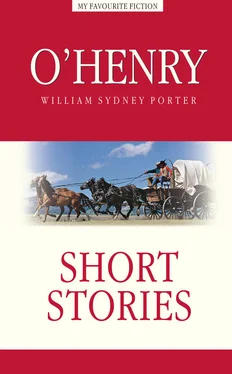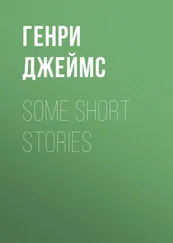Givens took the proffered hand. He held it for a time while he allowed the generosity of his nature to overcome his grief at the loss of Bill. At last it was clear that he had forgiven her.
“Please don’t speak of it any more, Miss Josefa. ’Twas enough to frighten any young lady the way Bill looked. I’ll explain it all right to the boys.”
“Are you really sure you don’t hate me?” Josefa came closer to him impulsively. Her eyes were sweet – oh, sweet and pleading with gracious penitence. “I would hate any one who would kill my kitten. And how daring and kind of you to risk being shot when you tried to save him! How very few men would have done that!” Victory wrested from defeat! Vaudeville turned into drama! Bravo, Ripley Givens!
It was now twilight. Of course Miss Josefa could not be allowed to ride on to the ranch-house alone. Givens resaddled his pony in spite of that animal’s reproachful glances, and rode with her. Side by side they galloped across the smooth grass, the princess and the man who was kind to animals. The prairie odors of fruitful earth and delicate bloom were thick and sweet around them. Coyotes yelping over there on the hill! No fear. And yet – Josefa rode closer. A little hand seemed to grope. Givens found it with his own. The ponies kept an even gait. The hands lingered together, and the owner of one explained.
“I never was frightened before, but just think! How terrible it would be to meet a really wild lion! Poor Bill! I’m so glad you came with me!”
O’Donnell was sitting on the ranch gallery:
“Hello, Rip!” he shouted – “that you?”
“He rode in with me,” said Josefa. “I lost my way and was late.”
“Much obliged,” called the cattle king. “Stop over, Rip, and ride to camp in the morning.”
But Givens would not. He would push on to camp. There was a bunch of steers to start off on the trail at daybreak. He said good-night, and trotted away.
An hour later, when the lights were out, Josefa, in her night-robe, came to her door and called to the king in his own room across the brick-paved hallway:
“Say, Pop, you know that old Mexican lion they call the ‘Gotch-eared Devil’ – the one that killed Gonzales, Mr Martin’s sheep herder, and about fifty calves on the Salada range? Well, I settled his hash this afternoon over at the White Horse Crossing. Put two balls in his head with my.38 while he was on the jump. I knew him by the slice gone from his left ear that old Gonzales cut off with his machete. You couldn’t have made a better shot yourself, Daddy.”
“Bully for you!” thundered Whispering Ben from the darkness of the royal chamber.
One may hope, in spite of the metaphorists, to avoid the breath of the deadly upas tree; one may, by great good fortune, succeed in blacking the eye of the basilisk; one might even dodge the attentions of Cerberus and Argus, but no man, alive or dead, can escape the gaze of the Rubberer.
New York is the Caoutchouc City. There are many, of course, who go their ways, making money, without turning to the right or the left, but there is a tribe abroad wonderfully composed, like the Martians, solely of eyes and means of locomotion.
These devotees of curiosity swarm, like flies, in a moment in a struggling, breathless circle about the scene of an unusual occurrence. If a workman opens a manhole, if a street car runs over a man from North Tarrytown, if a little boy drops an egg on his way home from the grocery, if a casual house or two drops into the subway, if a lady loses a nickel through a hole in the lisle thread, if the police drag a telephone and a racing chart forth from an Ibsen Society reading-room, if Senator Depew or Mr Chuck Connors walks out to take the air – if any of these incidents or accidents takes place, you will see the mad, irresistible rush of the “rubber” tribe to the spot.
The importance of the event does not count. They gaze with equal interest and absorption at a chorus girl or at a man painting a liver pill sign. They will form as deep a cordon around a man with a club-foot as they will around a balked automobile. They have the furor rubberendi. They are optical gluttons, feasting and fattening on the misfortunes of their fellow beings. They gloat and pore and glare and squint and stare with their fishy eyes like goggle-eyed perch at the book baited with calamity.
It would seem that Cupid would find these ocular vampires too cold game for his calorific shafts, but have we not yet to discover an immune even among the Protozoa? Yes, beautiful Romance descended upon two of this tribe, and love came into their hearts as they crowded about the prostrate form of a man who had been run over by a brewery wagon.
William Pry was the first on the spot. He was an expert at such gatherings. With an expression of in-tense happiness on his features, he stood over the victim of the accident, listening to his groans as if to the sweetest music. When the crowd of spectators had swelled to a closely packed circle William saw a violent commotion in the crowd opposite him. Men were hurled aside like ninepins by the impact of some moving body that clove them like the rush of a tornado. With elbows, umbrella, hat-pin, tongue, and fingernails doing their duty, Violet Seymour forced her way through the mob of onlookers to the first row. Strong men who even had been able to secure a seat on the 5.30 Harlem express staggered back like children as she bucked centre. Two large lady spectators who had seen the Duke of Roxburgh married and had often blocked traffic on Twenty-third Street fell back into the second row with ripped shirtwaists when Violet had finished with them. William Pry loved her at first sight.
The ambulance removed the unconscious agent of Cupid. William and Violet remained after the crowd had dispersed. They were true Rubberers. People who leave the scene of an accident with the ambulance have not genuine caoutchouc in the cosmogony of their necks. The delicate, fine flavor of the affair is to be had only in the after-taste – in gloating over the spot, in gazing fixedly at the houses opposite, in hovering there in a dream more exquisite than the opium-eater’s ecstasy. William Pry and Violet Seymour were connoisseurs in casualties. They knew how to extract full enjoyment from every incident.
Presently they looked at each other. Violet had a brown birthmark on her neck as large as a silver half-dollar. William fixed his eyes upon it. William Pry had inordinately bowed legs. Violet allowed her gaze to linger unswervingly upon them. Face to face they stood thus for moments, each staring at the other. Etiquette would not allow them to speak; but in the Caoutchouc City it is permitted to gaze without stint at the trees in the parks and at the physical blemishes of a fellow creature. At length with a sigh they parted. But Cupid had been the driver of the brewery wagon, and the wheel that broke a leg united two fond hearts.
The next meeting of the hero and heroine was in front of a board fence near Broadway. The day had been a disappointing one. There had been no fights on the street, children had kept from under the wheels of the street cars, cripples and fat men in negligee shirts were scarce; nobody seemed to be inclined to slip on banana peels or fall down with heart disease. Even the sport from Kokomo, Ind., who claims to be a cousin of ex-Mayor Low and scatters nickels from a cab window, had not put in his appearance. There was nothing to stare at, and William Pry had premonitions of ennui.
But he saw a large crowd scrambling and pushing excitedly in front of a billboard. Sprinting for it, he knocked down an old woman and a child carrying a bottle of milk, and fought his way like a demon into the mass of spectators. Already in the inner line stood Violet Seymour with one sleeve and two gold fillings gone, a corset steel puncture and a sprained wrist, but happy. She was looking at what there was to see. A man was painting upon the fence:
Читать дальше
Конец ознакомительного отрывка
Купить книгу












